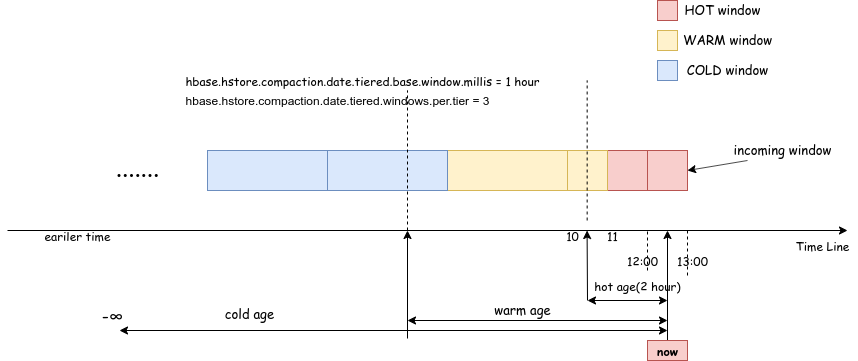6.7 KiB
Heterogeneous Storage for Date Tiered Compaction
Objective
Support DateTiredCompaction(HBASE-15181) for cold and hot data separation, support different storage policies for different time periods of data to get better performance, for example, we can configure the data of last 1 month in SSD, and 1 month ago data was in HDD.
- Date Tiered Compaction (DTCP) is based on date tiering (date-aware), we hope to support the separation of cold and hot data, heterogeneous storage. Set different storage policies (in HDFS) for data in different time windows.
- DTCP designs different windows, and we can classify the windows according to the timestamps of the windows. For example: HOT window, WARM window, COLD window.
- DTCP divides storefiles into different windows, and performs minor Compaction within a time window. The storefile generated by Compaction will use the storage strategy of this window. For example, if a window is a HOT window, the storefile generated by compaction can be stored on the SSD. There are already WAL and the entire CF support storage policy (HBASE-12848, HBASE-14061), our goal is to achieve cold and hot separation in one CF or a region, using different storage policies.
Definition of hot and cold data
Usually the data of the last 3 days can be defined as HOT data, hot age = 3 days.
If the written timestamp of the data(Cell) is > (timestamp now - hot age), we think the data is hot data.
Warm age can be defined in the same way. Only one type of data is allowed.
If data timestamp < (now - warm age), we consider it is COLD.
if timestamp >= (now - hot age) , HOT data
else if timestamp >= (now - warm age), WARM data
else COLD data
Time window
When given a time now, it is the time when the compaction occurs. Each window and the size of
the window are automatically calculated by DTCP, and the window boundary is rounded according
to the base size.
Assuming that the base window size is 1 hour, and each tier has 3 windows, the current time is
between 12:00 and 13:00. We have defined three types of winow (HOT, WARM, COLD). The type of
winodw is determined by the timestamp at the beginning of the window and the timestamp now.
As shown in the figure 1 below, the type of each window can be determined by the age range
(hot / warm / cold) where (now - window.startTimestamp) falls. Cold age can not need to be set,
the default Long.MAX, meaning that the window with a very early time stamp belongs to the
cold window.

Example configuration
| Configuration Key | value | Note |
|---|---|---|
| hbase.hstore.compaction.date.tiered.storage.policy.enable | true | if or not use storage policy for window. Default is false |
| hbase.hstore.compaction.date.tiered.hot.window.age.millis | 3600000 | hot data age |
| hbase.hstore.compaction.date.tiered.hot.window.storage.policy | ALL_SSD | hot data storage policy, Corresponding HDFS storage policy |
| hbase.hstore.compaction.date.tiered.warm.window.age.millis | 20600000 | |
| hbase.hstore.compaction.date.tiered.warm.window.storage.policy | ONE_SSD | |
| hbase.hstore.compaction.date.tiered.cold.window.storage.policy | HOT |
The original date tiered compaction related configuration has the same meaning and maintains
compatibility.
If hbase.hstore.compaction.date.tiered.storage.policy.enable = false. DTCP still follows the
original logic and has not changed.
Storage strategy
HDFS provides the following storage policies, you can refer to https://hadoop.apache.org/docs/current/hadoop-project-dist/hadoop-hdfs/ArchivalStorage.html
| Policy ID | Policy Name | Block Placement (3 replicas) |
|---|---|---|
| 15 | Lasy_Persist | RAM_DISK: 1, DISK: 2 |
| 12 | All_SSD | SSD: 3 |
| 10 | One_SSD | SSD: 1, DISK: 2 |
| 7 | Hot (default) | DISK: 3 |
| 5 | Warm | DISK: 1, ARCHIVE: 2 |
| 2 | Cold | ARCHIVE: 3 |
Date Tiered Compaction (DTCP) supports the output of multiple storefiles. We hope that these storefiles can be set with different storage policies (in HDFS). Therefore, through DateTieredMultiFileWriter to generate different StoreFileWriters with storage policy to achieve the purpose.
Why use different child tmp dir
Before StoreFileWriter writes a storefile, we can create different dirs in the tmp directory of the region and set the corresponding storage policy for these dirs. This way StoreFileWriter can write files to different dirs.
Since HDFS does not support the create file with the storage policy parameter (See https://issues.apache.org/jira/browse/HDFS-13209 and now not support on hadoop 2.x), and HDFS cannot set a storage policy for a file / dir path that does not yet exist. When the compaction ends, the storefile path must exist at this time, and I set the storage policy to Storefile.
But, in HDFS, when the file is written first, and then the storage policy is set. The actual storage location of the data does not match the storage policy. For example, write three copies of a file (1 block) in the HDD, then set storage policy is ALL_SSD, but the data block will not be moved to the SSD immediately. “HDFS wont move the file content across different block volumes on rename”. Data movement requires the HDFS mover tool, or use HDFS SPS (for details, see https://issues.apache.org/jira/browse/HDFS-10285), so in order to avoid moving data blocks at the HDFS level, we can set the file parent directory to the storage policy we need before writing data. The new file automatically inherits the storage policy of the parent directory, and is written according to the correct disk type when writing. So as to avoid later data movement.
Over time, the original HOT data will become WARM / COLD and no longer belong to the HOT window. When the compaction occurs again, the data will be automatically downgraded, such as from SSD to HDD. The compaction mechanism will generate a new file (write into HDD) and delete it Old file (SSD).